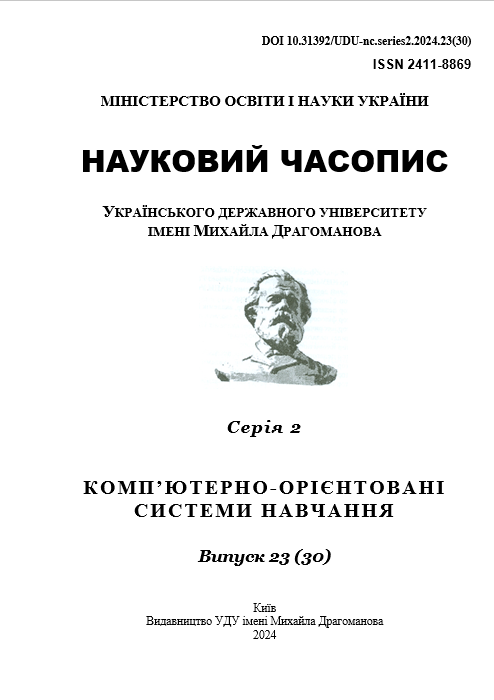Theory and practice of monitoring the digital educational environment: domestic and foreign experience
DOI:
https://doi.org/10.31392/UDU-nc.series2.2024.23(30).05Keywords:
monitoring studies in education, monitoring the effectiveness of the digital environment, digitalization of education, information and communication technologies (ICT), digital technologiesAbstract
The digital transformation process in Ukrainian education takes place in the context of modern trends and the global needs of society. The article analyzes the theoretical and methodological principles of educational monitoring as a system, process, and tool for researching various aspects of the digital educational environment, the functioning of educational systems, educational policies, and learning outcomes. The best international and domestic monitoring research practices regarding various aspects of the digitalization of education are considered, including: International Computer and Information Literacy Study ICILST (International Computer and Information Literacy Study), which is implemented with the support of the International Association for the Measurement of Educational Achievements IEA (International Association for the Evaluation of Educational Achievement); Teaching and Learning International Survey TALIS (Teaching and Learning International Survey), conducted by the Organization for Economic Cooperation and Development (ODCE); national-level research "Monitoring digitalization of basic education MyRA" ("Monitor Digitalisering Funderend Onderwijs MyRA", the Netherlands), of the Ukrainian Center for the Assessment of the Quality of Education, monitoring the formation of information and digital competence of teachers of general secondary education institutions in In Kyiv (1st stage) with the support of the State Education Quality Service, a nationwide online survey of teachers regarding their use of digital tools and ICT, conducted by the Institute of Digitalization of Education of the National Academy of Sciences of Ukraine and the State Scientific Institution "Institute of Modernization of Education Content". Modern theories and approaches implemented at various stages in planning, development, organization, implementation, and interpretation of monitoring results are singled out. The main provisions of the Theory of planned behavior (The theory of planned behavior, Ajzen I.) and the modern theory of IRT testing (Item Response Theory), which is known as the modern theory of mental tests (Modern Mental Test Theory), are described. The role of the gender approach in education and its place in monitoring studies of the digital educational environment are considered. The research results are summarized, and recommendations are given.

